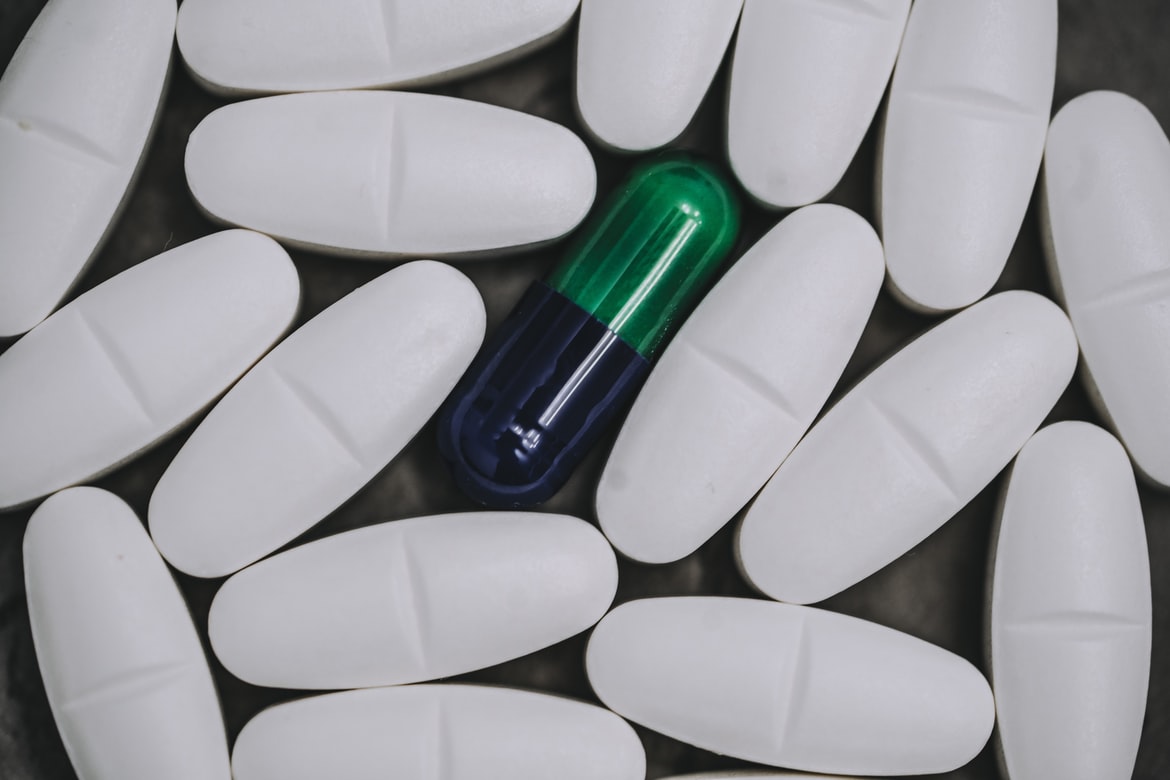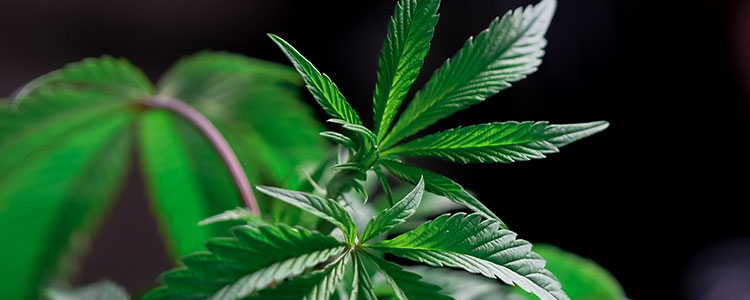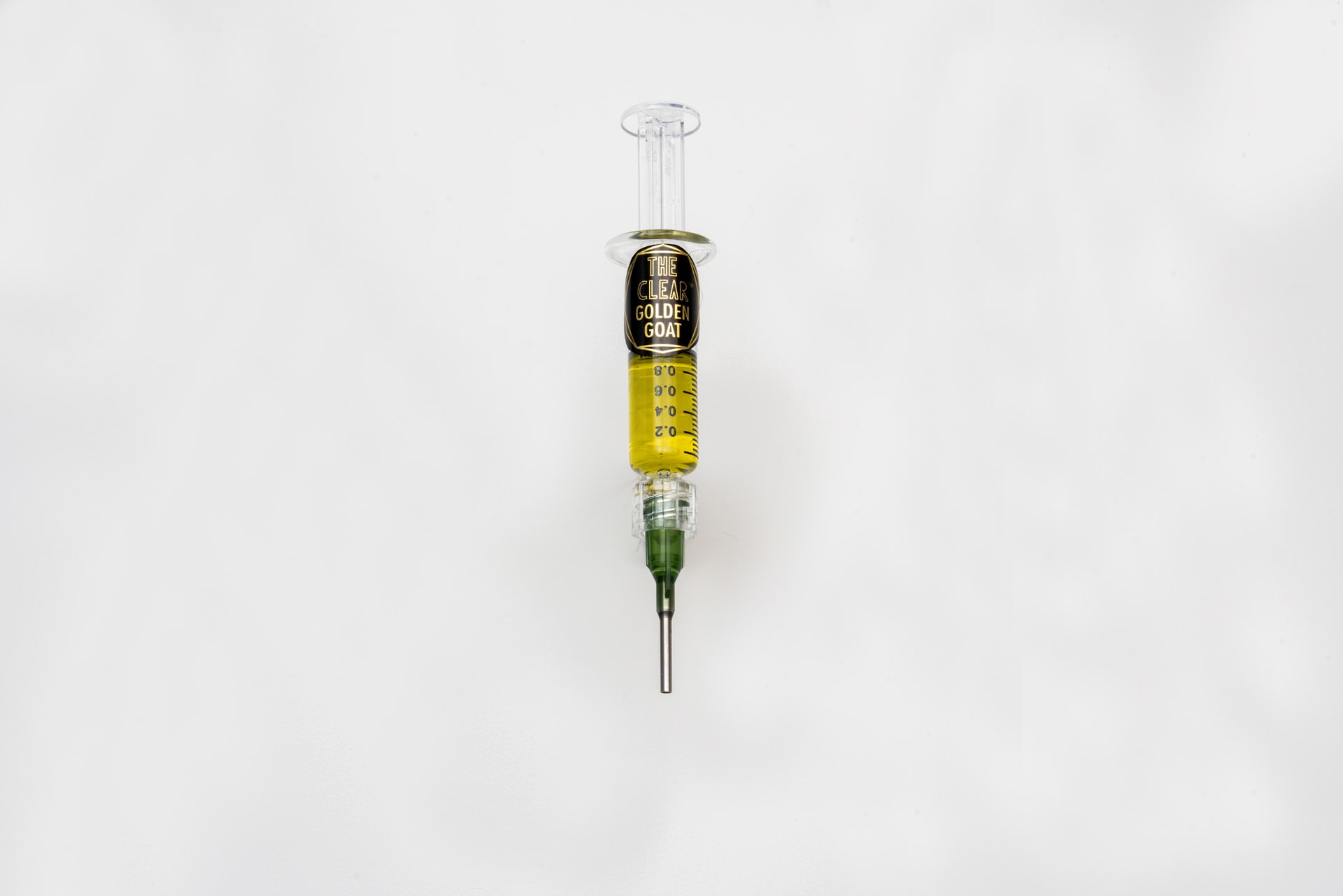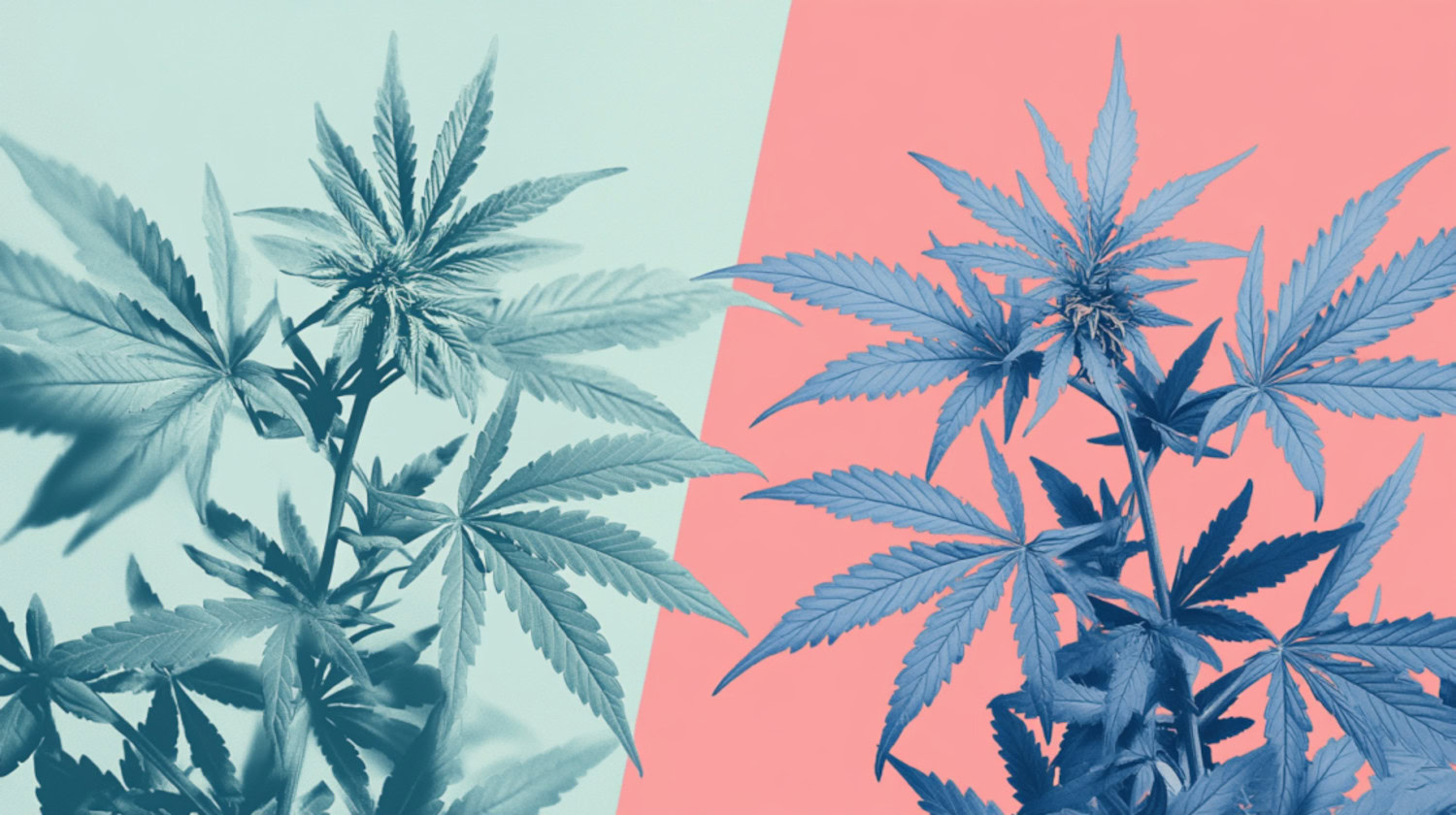As medical and adult-use cannabis legalization expands throughout the country, the types of products available to consumers have increased. Depending on the state, cannabis can be found in traditional flower form, concentrates, pre-rolled joints, edibles, tinctures, and capsules.
For people attempting to avoid smoke inhalation or just looking for a more direct way to experience cannabis, THC pills – or weed capsules – can be an ideal alternative mode of consumption.
This article will discuss what THC and other cannabis pills are, the different types, their benefits and drawbacks, how to take them, and how they compare to other consumption methods.
What are THC Pills?
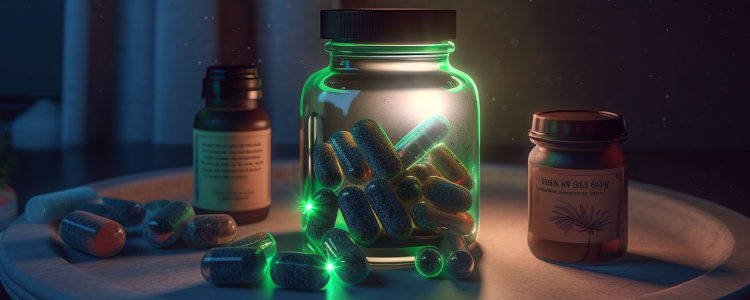
Weed capsules are gelatin capsules filled with various forms of cannabis. They come in one of three different forms, all of which can have different effects on consumers.
- Oil-based or concentrate
- Crystalline
- Flower
Each of these different variations can come either with decarboxylated or non-decarboxylated cannabis. Decarbed THC has been “activated” and can have intoxicating effects. Non-decarboxylated THC – or THCA – is not intoxicating. CBD can also come in either decarboxylated or non-decarboxylated form (CBDA), though it remains non-intoxicating.
Capsules typically come in single cannabinoid variations, most often THC or CBD, in dosages like 10, 25, 50, and 100-milligram options. Then there are ratioed options that include both THC and CBD, and consumers will see ratios like 1:1, 3:1, and 30:1.
The variety of options allows for a range of consumer needs to be met, whether you’re looking to microdose or you need a higher concentration option. In California, edibles are restricted to 100 mg per package, but wellness products like capsules can be found in packages that contain up to 1000 mg of THC. So although edibles may be cheaper per package, investing in capsules can allow consumers to buy larger quantities of cannabinoids at a time.
Capsules are also a discreet way of consuming cannabis. There is no odor, and the packaging is generally less eye-catching than many recreational edibles. Consumers don’t have to grind, roll or pack anything. They don’t need extra materials like a pipe, bong, rolling papers, or even a lighter. All they may need is water to help them swallow the pill.
Consuming THC pills has similar effects to consuming cannabis edibles. The body converts the THC cannabinoid into 11-Hydroxy-THC in the digestive system, resulting in a more potent experience than when inhaled. The onset time is also similar to edibles, which can range from 30 minutes to up to two hours. With capsules, users can get their desired dosage without any extra ingredients, like unwanted sugar. Some consumers consider this a healthier alternative to edibles.
Beyond natural cannabis-based capsules available at your local dispensary, there are FDA-approved synthetic cannabis capsules, like Marinol. These THC pills are available through traditional pharmacies and can be obtained with a physician's prescription.
What Are the 3 Types of THC Pills (and How Do They Differ)?

Cannabis pills can be found in three varieties: crystalline, oil-based, and flower. They can come in a range of milligrams per capsule and, depending on the brand and concentration, can range in price from $30-$100 per container.
1. Crystalline capsules
Cannabis crystalline, also called diamonds because of their solid diamond-like shape, is the purest form of concentrate. By stripping plant material and terpenes, cannabis is refined into a single compound – THCA, CBDA, or CBD – also known as an isolate.
This refinement results in a pure but tasteless concentrate that can be put into gelatine capsules without adding oil. Advocates of cannabis crystals love that they’re getting the purest possible product. But by removing terpenes and other cannabinoids, crystals miss out on the entourage effect, which may cause them to lose some of their effectiveness.
Crystalline capsules are not as common as oil-based ones and can be challenging to find on menus.
2. Oil capsules
Many commercially available weed capsules are filled with cannabis concentrate or isolate and mixed with a medium-chain triglyceride (MCT) oil. Since cannabinoids are not water-soluble, mixing them with an MCT oil allows them to be absorbed into the body through the digestive system more efficiently.
While THC pills are one variety of infused capsule, consumers can also find CBD pills and THC/CBD options. Oil capsules come in incremental dosages, typically starting around 10mg per pill. For those products that include both THC and CBD, ratios tend to range from 1:1 to 30:1, with different ratios providing different effects. Users looking for a mild experience may wish to start with a CBD-rich (20:1 CBD/THC) or a CBD isolate capsule.
Papa & Barkley and Mary's Medicinals are two well-known brands with high quality oil-based cannabis capsules available in a variety of ratios.
3. Flower capsules
Although less common, cannabis capsules can also be filled with dried flower, either decarboxylated and non-decarboxylated. Each has different effects on users.
Decarboxylated cannabis capsules provide an intoxicating "high" feeling because of the active THC. Just like when lighting up flower in a joint or bowl, the heat causes THCA and CBDA to "activate," turning these naturally occurring cannabinoids into the better known THC and CBD.
Non-decarboxylated cannabis capsules are rich in non-activated cannabinoids like THCA, which may carry its own benefits (without the intoxicating effects of THC). Early stage studies have associated THCA with pain relief, reduced inflammation, and other potential benefits, though much more research is needed before consumers should consider THCA as a potential treatment method.
Weed capsules packed with dried flower aren’t found in most dispensaries, but they can be made at home.
Advantages of THC Pills
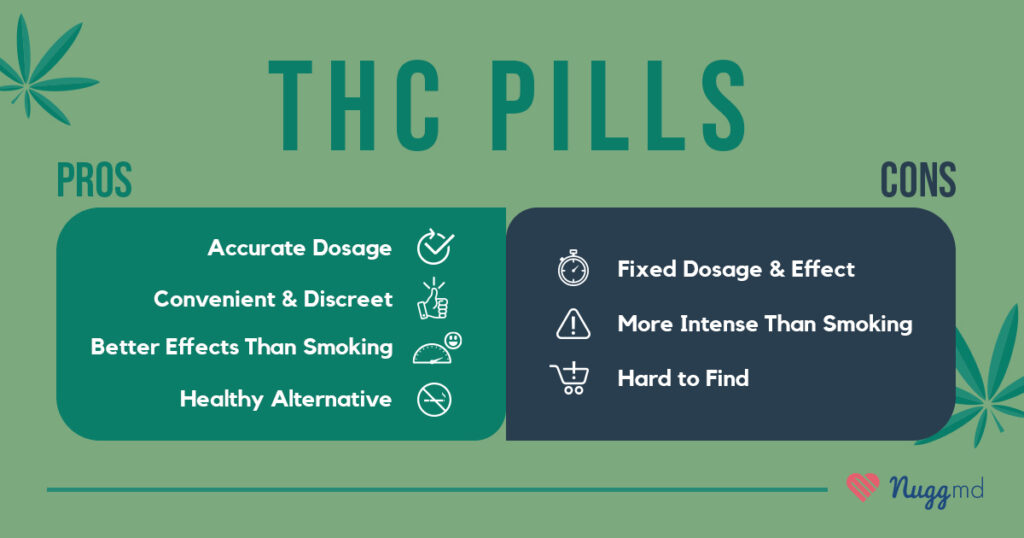
Cannabis capsules provide several advantages that can be hard to find in other common consumption methods like smoking or vaping.
Accurate and consistent dosage
Because THC and CBD pills are crafted for precise dosing, consumers will know exactly how many milligrams of their desired cannabinoid they’re consuming. The precise dosage offers medical marijuana patients a more predictable and consistent experience. And with options from pure CBD to up to 100mg of pure THC readily available, there’s a capsule for new consumers, microdosers, and high-tolerance users who need a higher concentration to achieve their desired effects.
Convenient
No extra bells or whistles are needed to consume THC capsules, though you may want a beverage to help swallow each dose. Capsule containers are easily stored and can be placed in a bag or purse to be readily available and travel-friendly when consumers need them.
Stronger and more prolonged effects than smoking
Because capsules are processed by the body like edibles, many users experience more intense effects over a more prolonged period of time.
Discreet
Smoking and vaping produce clouds of smoke that can have pungent smells. And edibles often come in brightly colored packaging that can draw extra attention. For consumers who want or need a more discreet option without sacrificing concentration, CBD and THC pills offer an effective solution.
Alternative to smoking
Inhaling any form of smoke, even cannabis smoke, can take a toll on a person's lungs. And added sugars and other ingredients found in many edibles can be less than desirable for discerning consumers. Capsules usually include minimal ingredients, giving medical cannabis patients an alternative to smoking, vaping, or eating sugary edibles.
Drawbacks of THC Pills
While THC capsules offer many advantages over other consumption methods, there are some drawbacks consumers should be aware of.
Committing to the dosage
Whatever dosage users choose, once consumed, they are committing to feeling those effects for five or more hours. And capsules can’t be easily cut in half like infused chocolates or gummies. The length of the experience – and the strength of the available dose – can be quite the commitment if a consumer is looking for short-lived relief.
Intensity

The way the digestive system metabolizes cannabinoids, like THC, into 11-hydroxy-THC can make the experience more intense than smoking or vaping, which is something to keep in mind for those just beginning to consume cannabis.
Difficult to find
Although capsules have grown in popularity, they still are not as sought after as edibles, vapes, or flower, and many dispensaries carry a limited selection.
How to Take THC Pills
Here is a step-by-step guide for consuming cannabis capsules.
- For a faster onset time, take the pill on an empty stomach. Food may delay the effects by about 30 min.
- "Start low. Go slow." When trying THC pills – especially for the first time – start with one low-dose pill between 5-10mg.
- Place the pill in the mouth and swallow, ideally with water.
- Wait 2 hours for the pill to take full effect.
- Do not take any more pills during that period. It is best to wait until the current dose completely wears off, at least 24 hours, to try a new or higher dosage.
- Clear your calendar. Once the effects set in, they can last five or more hours. If experimenting with dosages or trying cannabis for the first time, document the experience for reference so you can modify or continue the dosage next time.
THC Pills vs Other Cannabis Products
Cannabis affects each individual differently, depending on a wide variety of factors including tolerance level, diet, hydration, metabolism, and more. It is important to note that regardless of consumption method, the intensity of the high will depend on the dosage and the individual’s tolerance level.
| Consumption method | How long it takes to feel effect | Duration of high | Intensity of high | Average price range |
| THC pills | 30 minutes to 2 hours | 5-8 hours | Ingestion of cannabis typically results in a more “intense” intoxicating feeling than compared to inhalation. | $60-$150 (1000 mg packages) |
| Edibles | 30 minutes to 2 hours | 5-8 hours | Ingestion of cannabis typically results in a more “intense” intoxicating feeling than compared to inhalation.. | $15-$35 (100mg package) |
| Smoking | 5-10 minutes | 2-4 hours | Inhalation effects can be intense, especially for new consumers or at higher doses or quantities. It is best to be sitting down when smoking cannabis in case you feel light headed. | Prerolled joints (singles) –$7-$50 8ths of flower – $20-$100 |
| Vaping | 5-10 minutes | 2-4 hours | Inhalation effects can be intense, especially for new consumers or at higher doses or quantities. It is best to be sitting down when vaping cannabis in case you feel light headed. | $35-$100 (Full grams) |
The information in this article and any included images or charts are for educational purposes only. This information is neither a substitute for, nor does it replace, professional legal advice or medical advice, diagnosis, or treatment. If you have any concerns or questions about laws, regulations, or your health, you should always consult with an attorney, physician or other licensed professional.

